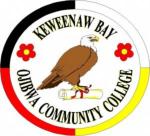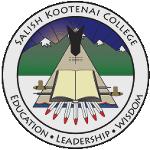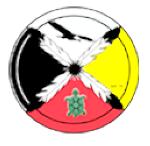 |
Canku Ota
|
 |
|
(Many Paths)
|
||
|
An Online Newsletter
Celebrating Native America
|
||
|
December 2015 - Volume
13 Number 12
|
||
|
|
||
|
Six Tribal Colleges
Receive EPA-AIHEC Tribal ecoAmbassador Grants
|
||
|
by AIHEC press release
|
||
| ALEXANDRIA, VA - This month, six Tribal Colleges and Universities
(TCUs) received competitive grants totaling $160,000 through the American
Indian Higher Education Consortium's longstanding Tribal ecoAmbassador
partnership with the U.S. Environmental Protection Agency (EPA).
The Tribal ecoAmbassador program empowers tribal communities to identify and address their own unique environmental needs while building the capacity of Tribal Colleges and Native students by encouraging relationships with federal scientists and offering hands-on field and laboratory experience. The program recognizes and honors an important factor that makes TCU's unique among institutions of higher education: the incorporation of traditional cultural knowledge with the western scientific method. "We are proud to be partnering with the EPA on this exciting and empowering initiative," said Carrie L. Billy, President & CEO of the American Indian Higher Education Consortium (AIHEC), which is the nation's 37 TCUs. "Each ecoAmabassador project is rooted in tribal culture and community need or aspiration, and in addressing that need or working toward that goal, TCU students are empowered to create positive change. They learn new research skills and through use of those skills, they rediscover important lessons from their tribe's history, lands, and ways of knowing. Their own identity is strengthened." In 2011, EPA first partnered with AIHEC to support the initial Tribal ecoAmbassadors project. In the years since, EPA has recognized the tremendous value of these modestly funded programs, and this year's round of grants marks the fifth year of the project. Under the initiative, each TCU develops its own project idea, based on its community's needs and the institution's capacity. Past projects have included recycling, traditional gardens, water and air quality research, traditional plant restoration, mercury accumulation in plant and animal tissue, and more. To date, the Tribal ecoAmbassador project has supported 26 projects at 15 TCUs. When a college receives an award, TCU professors and students are matched with EPA staff with federal scientists who are working in the same field on similar projects and can offer expertise, connections, or training. Six TCUs received grants this year, including:
AIHEC is the collective spirit and unifying voice of our nation's 37 TCUs - a unique community of tribally and federally chartered public institutions of higher education working to make a difference in the lives of many thousands of American Indian and Alaska Native students, their families, and their communities. |
|||||||||||
|
|
|
|
||
|
|
||
| Canku Ota is a free Newsletter celebrating Native America, its traditions and accomplishments . We do not provide subscriber or visitor names to anyone. Some articles presented in Canku Ota may contain copyright material. We have received appropriate permissions for republishing any articles. Material appearing here is distributed without profit or monetary gain to those who have expressed an interest. This is in accordance with Title 17 U.S.C. Section 107. | ||
|
Canku Ota is a copyright ©
2000 - 2015 of Vicki Williams Barry and Paul Barry.
|
||
 |
 |
|
|
The "Canku
Ota - A Newsletter Celebrating Native America" web site and
its design is the
|
||
|
Copyright ©
1999 - 2015 of Paul C. Barry.
|
||
|
All Rights Reserved.
|
||
 Haskell
Indian Nations University, Lawrence, KS - $35,000. The HINU
Tribal ecoAmbassador project will focus on food waste reduction
in the campus cafeteria, as well as, a campus-wide effort to
landscape the campus with a focus on planting traditional polyculture
vegetable gardens, native Kansas prairie grasses, wild flowers,
shrubs and fruit bearing trees.
Haskell
Indian Nations University, Lawrence, KS - $35,000. The HINU
Tribal ecoAmbassador project will focus on food waste reduction
in the campus cafeteria, as well as, a campus-wide effort to
landscape the campus with a focus on planting traditional polyculture
vegetable gardens, native Kansas prairie grasses, wild flowers,
shrubs and fruit bearing trees. Keweenaw
Bay Ojibwa Community College, Baraga, MI - $35,000. The KBOCC
Tribal ecoAmbassador project will continue and expand water
temperature profiling efforts in habitats of local fish management
species as part of the implementation of best-management practices
for fisheries of the Lake Superior region.
Keweenaw
Bay Ojibwa Community College, Baraga, MI - $35,000. The KBOCC
Tribal ecoAmbassador project will continue and expand water
temperature profiling efforts in habitats of local fish management
species as part of the implementation of best-management practices
for fisheries of the Lake Superior region. Salish
Kootenai College, Pablo, MT - $35,000. The SKC Tribal ecoAmbassador
project will locate and quantify arsenic concentrations in well
water on CSKT land and inform community members if wells are
found with elevated arsenic levels and how to access safe drinking
water.
Salish
Kootenai College, Pablo, MT - $35,000. The SKC Tribal ecoAmbassador
project will locate and quantify arsenic concentrations in well
water on CSKT land and inform community members if wells are
found with elevated arsenic levels and how to access safe drinking
water. Turtle
Mountain Community College, Belcourt, ND - $35,000. The TMCC
Tribal ecoAmbassador project will research recreational activities
in Tribal lakes to determine if such activities lead to water
contamination resulting in a hazardous environment for invertebrate
organisms, specifically leech.
Turtle
Mountain Community College, Belcourt, ND - $35,000. The TMCC
Tribal ecoAmbassador project will research recreational activities
in Tribal lakes to determine if such activities lead to water
contamination resulting in a hazardous environment for invertebrate
organisms, specifically leech. Institute
of American Indian Arts, Santa Fe, NM - $10,000. The IAIA Tribal
ecoAmbassador project will use art and permaculture to enhance
public spaces and to create restoration and passive water harvesting
systems and bio-retention rain gardens.
Institute
of American Indian Arts, Santa Fe, NM - $10,000. The IAIA Tribal
ecoAmbassador project will use art and permaculture to enhance
public spaces and to create restoration and passive water harvesting
systems and bio-retention rain gardens.  Northwest
Indian College, Bellingham, WA - $10,000. The NWIC Tribal ecoAmbassador
project, Rooted Relationships, builds upon previous efforts
at Northwest Indian College to expand and enhance facilities,
materials and instruction concerning the interrelation of people,
plants and wellness.
Northwest
Indian College, Bellingham, WA - $10,000. The NWIC Tribal ecoAmbassador
project, Rooted Relationships, builds upon previous efforts
at Northwest Indian College to expand and enhance facilities,
materials and instruction concerning the interrelation of people,
plants and wellness.